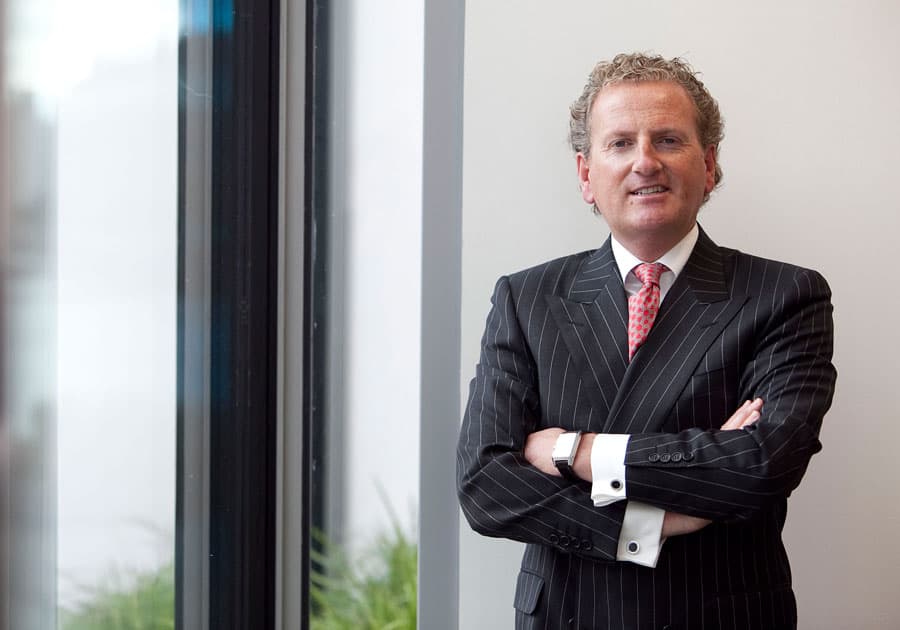HSBC’s head of corporate banking Alan Duffy tells John Walsh why he thinks Ireland’s strong export potential offers his bank a bright future.
There are probably not too many bankers who look forward to doing business in this country over the next few years. The domestic banks will spend the foreseeable future trying to raise capital and shrink their balance sheets. There are a number of foreign-owned institutions which have decided to cut their losses and run on the basis that Ireland is on the verge of a debt deflationary spiral and will offer slim pickings in the future. Alan Duffy sees things differently. He says that HSBC is looking to expand over the next few years on the back of growing corporate activity, particularly Irish companies which are looking to expand overseas. But then again, it helps that HSBC doesn’t have any exposure to either Irish residential or commercial property. When the bank launched its franchise in 2007, it steered clear of the property market.
The property market is hanging over the economy a bit like the sword of Damocles. Inevitably, there are a number of doom-laden forecasts about the future of the economy. The debt burden, which could reach 120% of GDP and possibly more, will choke off growth. Duffy says what is happening is a tale of two economies. “The domestic economy is very challenging, but exports are booming.”
“The amount of debt in the economy is significant, but if you go back to the 1980s and look at what it cost to service debt then, today it is nowhere near that level. My view is that the debt we have as a nation is serviceable and the premium we are paying should lessen as stability comes back into the market. I think it is only a matter of time before the NTMA will be able to access the market. I don’t think the third or fourth quarter of 2011 is unreasonable. We moved early to restore structural issues and we are becoming increasingly competitive.”
Ireland is a small country that only comes under the radar of international investors these days when the national coffers hit the buffers. The crisis that has enveloped the Irish sovereign debt issuances has spread to the corporate sector. But not at a rate that is hampering the ability of Irish corporates to raise money, says Duffy.
“The sovereign downgrades, the IMF package and the international noise around Ireland absolutely did have an impact. However, if you look at any of the large cap companies, 70%-80% of their turnover is outside the domestic market. While there is a premium paid by corporates, the markets are still open for business. If you look at the US private placement market, that is still open for business for Irish corporates; the syndicated loan market is open for business; the bilateral market is open for business. I don’t see a problem raising funds, but there will be a premium, but in terms of the cost of capital I don’t see it having a material effect.”
Duffy says that loan tenors are widening for the first time since 2008. When the banking system became paralysed following the credit crunch, corporates were finding it hard to arrange anything beyond short-term finance. Now terms of up to five years are back on the market, says Duffy.
Overall, Duffy is bullish about the prospects for corporate Ireland. He cites the recent Bord Bia report which called for a huge ramp up in food exports over the next decade as one of the areas that will deliver healthy returns. Medical devices, life-sciences and technology are other areas that offer good potential.
“The key piece for HSBC here is giving companies balance sheet support in terms of debt. And if you look at the food side of things, companies like Kerry Group and the Irish Dairy Board, we are working with them both here and abroad. We are seeing a lot of building materials companies looking to diversify into the Middle East and we are natural partners in those markets. We will be joining a trade delegation to the Middle East in February which is spearheaded by Enterprise Ireland.”
Duffy argues that the value proposition HSBC offers in the high-growth countries of the Middle East and Asia is knowledge of the local markets.
“We can open doors in these markets and circumvent a lot of the red tape. Countries like China and India are high-growth markets but they are hard to get into. We have worked with a number of small, medium and large companies in these countries where we have acted as a door opener and provided finance.”
Most of HSBC’s target market are companies with turnover north of €200mn. Duffy says that because HSBC does not have a retail franchise in Ireland it cannot compete with the domestic banks in terms of small and medium enterprises. “But we don’t operate hard and fast rules in terms of a cut-off point. We have done a significant amount of business between €50mn and €200mn. We are opportunistic in terms of what we look at. We helped a small information technology company set up in China recently. The total investment was €7.5mn.”
HSBC does not break out figures for its Irish operations. Moreover, the bank is in a pre-results closed period when the interview takes place, so Duffy says any discussion of figures are strictly off-limits. But HSBC’s corporate banking business in Ireland is growing robustly, he says. The department hired 12 new employees last year and it is likely to add another twelve employees this year. Trade finance, payments and cash management, treasury and relationship management are the areas that are seeing an upswing in business, says Duffy.
In a recent address to the International Institute of European Affairs (IIEA) the Governor of the Central Bank Patrick Honohan said that the optimal solution for the domestic banking sector would be if it was sold off to international investors. HSBC certainly has the balance sheet strength to pick up one of the big banks. Moreover, acquiring one of the Irish banks would give HSBC a retail franchise which would enable it to penetrate the domestic market much more speedily than pursuing an organic approach.
Duffy declines to make any comment on a possible acquisition. He also remains tight- lipped on whether the domestic banking franchises represented good value at these levels. “We are in closed period so I cannot make any comments on these issues.”
However, he says there are plenty of opportunities to grow the business organically and that remains the focus for HSBC. He says that Irish corporates at the larger end of the yield curve are in good shape. “They have spent since 2008 deleveraging their balance sheets.
“The credit crunch that has happened in this country, happened at the level of SMEs. All Irish transactions at the mid to upper level, whether they are syndicated deals or bilateral loans, got done. Balance sheets are in excellent shape. Interest rates are low and there are high levels of liquidity.”
M&A
Duffy says that there is going to be a significant uptick in merger and acquisition activity in 2011 on the basis that corporates have the ammunition to move quickly. The food ingredients sector, medical devices and buildings materials offer a rich seam of opportunities. However, there is probably a bit to go in terms of valuations before there is a sustained level of merger activity.
“Valuations have come back significantly from the heady days of a few years back. The feedback we are getting from chief financial officers is that they are still waiting. They see valuations as still being a bit demanding. It is a bit like the property market, they still see a bit to go. There is a coyness in Irish business but 2011 will mark a watershed year in terms of companies moving aggressively.”
In addition to having strong balance sheets, many companies are sitting on credit facilities that they have not tapped. “A corporate may have a credit facility of €100m. A few years back they would have been using up to 70% of this facility at any one time. Now they are using maybe 10% to 15% of this facility, so they are ready to move quickly in the M&A market if they see the right opportunity.”
Ireland’s reputation has taken a battering on the international markets over the past few years. Events at domestic institutions appeared to reinforce the perception that this country was indeed the wild west of the financial markets. Did that perception affect HSBC’s Ireland’s relationship with its head office? “It was a factor but it never impacted our ability to do business in this market. We are delighted that every transaction that we presented to the local and external credit committee has been approved. In the early days of the franchise [2007] we would not enter the real estate market. It was clearly a bubble and we were focused on trading companies.”
Duffy says the future of the Irish banking system is smaller in scale. “I think there is a bit of pain to go in the domestic banking sector but a significant amount has already been factored in. There is a bit more pain to come in residential mortgages. But if you strip out the froth of the real estate bubble, there is a fundamentally sound retail banking structure. Confidence has a huge amount to do with it and that will take time.”
Regulatory shortcomings were at the root of the domestic financial crisis. “We have moved quickly to ensure a best-in-class regulatory framework. But regulation in itself will not be the saviour of financial services but it has an important role in ensuring that there aren’t massive swings in the financial sector. It has to be back to basics for banks. It should be incredibly boring if done correctly and it should also provide a critical role in supporting the economy.”
In terms of getting the overall Irish economy back on track, he argues the 12.5% corporate tax rate is crucial. There has to be continued investment in education, particularly in the areas of maths and science and there has to be continued downward pressure on the cost base. “But most of all I think we have to restore the reputation of Ireland; that it is an open dynamic economy that is open for business.”
[hignlight]
Alan Duffy, Head of Corporate Banking Ireland
Duffy joined HSBC in July 2006 from ING Bank N.V. where he was Head of Wholesale Banking, based in Dublin. He also held the position of Head of Lending with Banque Bruxelles Lambert. Prior to that he spent five years at Scotiabank (Ireland) Limited, with responsibility for corporate lending activities throughout the Nordic market.
His early career included a variety of corporate and commercial banking roles with the Bank of Nova Scotia and First Southern Bank.
Duffy is a Business Studies graduate of Trinity College Dublin, and holds an MBA from the Smurfit Business School, University College Dublin.
HSBC in Ireland
HSBC has been in Ireland for over 30 years and now employs 530 people across four main businesses Securities Services, Corporate Banking, Private Bank and Insurance. It also employs 110 people in Northern Ireland, providing personal financial and commercial banking services through its six branches.
[/highlight]







